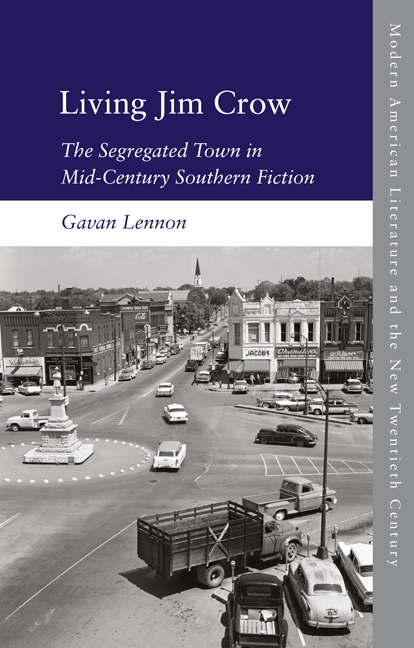Book contents
- Frontmatter
- Contents
- Acknowledgements
- Introduction: Uncovering a Poetics of Protest
- 1 Creators of the Small Town: Anthropology, Racial Etiquette and African American Fiction in the 1930s
- 2 The White Town/Coloured Town Paradigm: Lillian Smith’s Maxwell
- 3 An Anatomy of Critique: Byron Herbert Reece’s Tilden
- 4 The Milan Cycle: Carson McCullers’s Milan
- 5 Breaking the Pencil: William Faulkner’s Jefferson
- 6 Knowing How to Curse: William Melvin Kelley’s Sutton
- Conclusion: (De)Generative Ground – The Field and the Segregated Town
- Notes
- Bibliography
- Index
4 - The Milan Cycle: Carson McCullers’s Milan
Published online by Cambridge University Press: 15 October 2020
- Frontmatter
- Contents
- Acknowledgements
- Introduction: Uncovering a Poetics of Protest
- 1 Creators of the Small Town: Anthropology, Racial Etiquette and African American Fiction in the 1930s
- 2 The White Town/Coloured Town Paradigm: Lillian Smith’s Maxwell
- 3 An Anatomy of Critique: Byron Herbert Reece’s Tilden
- 4 The Milan Cycle: Carson McCullers’s Milan
- 5 Breaking the Pencil: William Faulkner’s Jefferson
- 6 Knowing How to Curse: William Melvin Kelley’s Sutton
- Conclusion: (De)Generative Ground – The Field and the Segregated Town
- Notes
- Bibliography
- Index
Summary
One of Carson McCullers's earliest short stories, published posthumously as ‘Untitled Piece’ in The Mortgaged Heart (1972), rehearses some of the characters and scenarios that would form the basis of the author's first novel, The Heart is a Lonely Hunter (1940). In the story, a white man named Andrew Leander arrives, drunk and aimless, in a small southern town. Leander emerges at the railway station restaurant ‘in a drunken turmoil’, and bears more than a passing resemblance to Jake Blount in McCullers's later novel. In the story's closing dialogue, Leander approaches a young boy working in the restaurant, uncertain where he has found himself: ‘I got off the bus half drunk. Will you tell me the name of this place?’ If Leander gets an answer, it is not reported in the story. In The Heart is a Lonely Hunter, too, the small town setting is not named, nor is the small-town setting in any of McCullers's subsequent long works, Reflections in a Golden Eye (1941), The Member of the Wedding (1946) or ‘The Ballad of the Sad Café’ (1952). Ostensibly, these texts share similarities of setting and of theme, but are set in distinct, separate archetypal southern towns. To the contrary, I argue that McCullers's novels are best understood as components in a narrative cycle that is made coherent by a shared setting in or around the fictional town of Milan, Georgia. Her final novel, Clock Without Hands (1961), makes these connections legible and acts as a capstone to what I term the ‘Milan Cycle’.
The novel centres on the lives of four southern men and culminates with the announcement of the Supreme Court decision in Brown v. Board of Education of Topeka on 17 May 1954. The four men– J. T. Malone, Sherman Pew, Jester Clane and Fox Clane – represent various points on the town's spectrum of racial politics. These characters represent the final stages in a political trajectory in Milan that McCullers begins charting in her earliest published fiction. Milan is only named in the novel that most overtly engages with the region's real history of civil rights activism. I argue that the symbiotic relationship between McCullers's cycle and the black freedom struggle is necessary to make sense of the cycle as a cycle. Milan, in short, can only be named when it is seen alongside an extended narrative of anti-racist activism.
- Type
- Chapter
- Information
- Living Jim CrowThe Segregated Town in Mid-Century Southern Fiction, pp. 123 - 158Publisher: Edinburgh University PressPrint publication year: 2020



